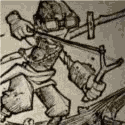|
Josef bugman posted:Sometimes you want to be told a story that you interact with. You do not want to tell the story yourself. Wanting to create a cool person to interact with a world is very different from wanting to create said world. Collaborative setting building doesn't require the players to tell the story themselves. It's typically about what their characters would reasonably be expected to know about the world which is good because it generates buy-in to the setting and avoids the problem of players creating adult characters who have just emerged from a time capsule and know nothing about the world (because players don't read rulebooks). It's not "what is going to happen", it's "what has already happened" There are 100s of GM-less games at this point, with Fiasco and Microscope I guess being the most well known. There are also a great number of games based on Apocalypse World, whose approach to GM prep is "maybe think about apocalyptic imagery a bit" and then gives you tools and a framework to aid improvisation during play. A significant part of AW's thesis statement is that extensive GM prep harms player agency, because it's not reasonable to expect a GM to be disinterested in the eventual fate of NPCs that take hours to stat up, or locations that require you to map them out on a grid in advance so that combat is interesting. The rudeness surprised me at the time, but then cognitive dissonance can do that to people and between D&D and WoD, players have been trained to believe that they have a right to expect significant time or monetary investment from the GM.
|
|
|
|

|
| # ? May 25, 2024 21:25 |
|
Kai Tave posted:Yeah, if trying to force people to play other games isn't going to be a success (it probably won't be) and barriers to entry are already as low as they can feasibly go unless people start paying other folks to play their games (they are), then unless someone grabs blackmail on Matt Mercer or wins the lottery and funds their own mega popular non-D&D stream, there is basically nothing that can really be done. Even waiting for WotC to make some sort of heinous fuckup that causes their entrenched fanbase to abandon them is unlikely given that they've spent the last month being publicly lambasted on social media for one lovely thing after another and they just don't care. - Maybe your group wants to play a very detail-oriented investigative game - the sort where the shortcuts offered by Gumshoe would offend you because you want solving the mystery to be a challenge of wits between you and the referee or the scenario writer, not something handed to you automatically as part of the pacing of the game. - Maybe you and your buddies are really keen about the idea of doing lots of research, like you are playing Maelstrom or Chivalry & Sorcery or Ars Magica or something and you want to go really in depth on the minutiae of the historical era or you're all Tekumel scholars or something. - Maybe your group has selected their system because the combat is fascinating, but has a steep learning curve before you're really able to make the system sing. - Maybe you're running an intensely political game involving lots of factional skullduggery and lavish detail to the point where everyone really needs to be on the ball and keep the whole knotted web straight in their head, because that is the specific experience your group wants. - Maybe you and your fellow players trust each other and the referee enough to play an astonishingly emotionally raw game, like an extreme horror-fest or a moving exploration of real-world tragedy or whatever. Those are all entirely legit games for consenting participants to enjoy with each other, but they are also games which would do a terrible job of siphoning players out of the D&D pool, because there's a significant barrier to entry in each of those concepts (investigative deduction, out-of-game-research, system mastery setting mastery, level of trust with other players) which other games won't have, but which will ruin the specific type of fun you and your buds were going after if you took it away, just like D&D would be ruined if you dialled back the barrier to entry by having an app which automatically generates your character for you and makes all your decisions for you so you don't have the barrier to entry of actually making a character and making your own decisions about what they do. It is important that RPGs try to reach out to a broader audience, but it's not the specific responsibility of every RPG to try and win over D&D players. Some games are particularly well-suited to being onramps to playing non-D&D RPGs, but equally some games are so specifically dedicated to offering a very niche experience that you ruin them if you try to take them out of that niche, and the best thing they can do is to try to explain why that niche is fun in the first place and market to people who might be keen on that niche, rather than marketing to the D&D audience.
|
|
|
|
Tarnop posted:Collaborative setting building doesn't require the players to tell the story themselves. It's typically about what their characters would reasonably be expected to know about the world which is good because it generates buy-in to the setting and avoids the problem of players creating adult characters who have just emerged from a time capsule and know nothing about the world (because players don't read rulebooks). It's not "what is going to happen", it's "what has already happened" That is understandable. Does Microscope count (never played Fiasco so I can't really comment) as a system? It's still a game, but the way I have mainly seen it used is to create a setting. Not to run an entire setting solely within it.
|
|
|
|
Tarnop posted:This has been a way bigger deal in my experience than I ever would have expected it to be. I had a player who I considered to be a pretty reasonable person up to this point launch into an angry rant when I suggested playing Fate because "why the gently caress should I have to do your job for you" in reference to collaborative building of the setting. This is useful because now you can tell them to go gently caress themselves for being an ungrateful sack of poo poo. Gray Ghost posted:Some homebrewers have actually endeavored to fix this in DW’s Discord. I recommend trying out the Dungeon World Unlimited mod, which fixes and streamlines a bunch of D&D-inspired mechanics, or the eventual Worlds of Adventure full system conversion. Keep in mind that Fellowship is not designed as a replacement Dungeon World as it isn't at all interested in replicating D&D dungeon crawling. It's a game for emulating the "journey far and wide to defeat the evil overlord" mode of fantasy which Dungeon World sucks at.
|
|
|
|
Xiahou Dun posted:I was being polite and keeping D&D in the math but unmentioned. Oh god no. Blades is rules heavy. The action roll core mechanic is 10 pages all by itself, including the material on effect, positioning, and consequences — which is important. It’s one of the most complex core mechanics I’ve ever seen. “I want to hurt the thugs.” “OK, first you need to decide which action you use. Then I’m going to decide what the position is. If you don’t like it you might choose a different action rating. Then I’m gonna choose an effect level, same deal. Then we go through bonus dice, which requires decisions on your part and on the part of other characters. Then roll, and we narrate the result, but I decide consequences.” “I want to hurt the thugs.” “OK, roll a d20 and add your Strength modifier. Tell me what the total is. If you hit, roll 1d10 plus the same modifier for damage.”
|
|
|
|
Pocky In My Pocket posted:I'm trying to work out what I like about D&D to see what people recommend as despite being into gaming for like 30 years I feel like I don't have that wide a base of games. You want Pathfinder 2e. It has all of this built in. @a computing pun: the game you want is Pathfinder 2e, too. It’s a little bit more gonzo (there’s robots and AI for example, and gnomes do have a setting-specific death clock) but nothing you can’t ignore. Arivia fucked around with this message at 14:52 on Jul 14, 2020 |
|
|
|
https://twitter.com/Leaky_cheese/status/1283015756733612033
|
|
|
|
Thanlis posted:“I want to hurt the thugs.” “OK, first you need to decide which action you use. Then I’m going to decide what the position is. If you don’t like it you might choose a different action rating. Then I’m gonna choose an effect level, same deal. Then we go through bonus dice, which requires decisions on your part and on the part of other characters. Then roll, and we narrate the result, but I decide consequences.” I think the counter-point to this is that you may only need to go through this process once, if it goes your way, rather than however many attack rolls it takes to reduce a D&D monster's HP to zero.
|
|
|
|
Thanlis posted:“I want to hurt the thugs.” “OK, first you need to decide which action you use. Then I’m going to decide what the position is. If you don’t like it you might choose a different action rating. Then I’m gonna choose an effect level, same deal. Then we go through bonus dice, which requires decisions on your part and on the part of other characters. Then roll, and we narrate the result, but I decide consequences.” The GM sets position and effect based on the fiction. The only thing the player has to do is describe how their PC is doing what they want them to do (which will feed directly into one or two action types, and it's on the GM to ask them to clarify if the description does point at more than one action), then decide whether to spend resources or not. All the effort prior to spending resources is on the GM's side and the player doesn't have to care about it at all. Lemon-Lime fucked around with this message at 14:56 on Jul 14, 2020 |
|
|
|
e: nm
Absurd Alhazred fucked around with this message at 20:06 on Jul 22, 2020 |
|
|
|
Heck, I'm running a Legacy 2E game right now for a table wherein the least experienced player has played 2d20, Torchbearer, and Blades. At the start of the session, I had to lowball some questions to get a sense of "how creative the table is feeling tonight". Even in shared creation / narrative games, sometimes players aren't feeling it and it's on the GM (or other players) to step up.
|
|
|
|
Given GW just threw a Black Library writer under the bus for saying 'bigots are bad and don't send death threats' Arch really shouldn't see the need.
|
|
|
|
Dawgstar posted:Given GW just threw a Black Library writer under the bus for saying 'bigots are bad and don't send death threats' Arch really shouldn't see the need. What, who?
|
|
|
|
Kwyndig posted:What, who? https://twitter.com/parrotttd/status/1281584694551875585
|
|
|
|
Absurd Alhazred posted:Where do you bootstrap the understanding that allows you to use that business card? By reading, discussing and playing games that aren't D&D, in the same way that your ability to understand D&D mechanics came from reading, discussing and playing D&D, and did not spring fully-formed from the aether. Absurd Alhazred posted:There are a lot of decisions and back and forth and uses of judgment that the rules say are good to have different in each table because they set the tone of the campaign between the GM and the player in question (and potentially other players) tied to each of these stages. This isn't a straightforward thing that people are immediately going to see the benefit of for heist games until, I presume, they "get it". This is literally all stuff you already do when playing D&D, just with slightly different words. The player tells the GM what they want their PC to do, and how they want to do it. D&D: "I want to jump over the pit trap." Blades: "I pull out my toolkit and start taking the door control panel apart." The GM decides how difficult this is, how effective succeeding would be, and what the consequences of failure would be. D&D: determine the Acrobatics DC and fall damage based on jump distance and the depth of the pit, and decide whether the player gets a bonus to their roll based on the circumstances. Blades: determine position (how bad the consequences of failure will be/how hard it is to succeed) and effect (how much impact succeeding will have on progressing the "get into the bank vault" clock) based on the PC's actions as they were just described. The player decides whether they like those odds and consequences or not, and makes choices accordingly. D&D: spend some of their limited resources to boost their chance of success or reduce the consequences of failure (drinking a potion of Cat's Grace or casting Featherfall) or decide to reconsider their approach entirely (cast Tenser's Floating Disk or double back). Blades: spend some of their limited resources to boost their chance of success or reduce the consequences of failure (pushing themselves for an extra die or better effect) or decide to reconsider their approach entirely (narrate their PC's actions differently for better position or effect). The player rolls, everyone agrees on what happened in the fiction based on the results of that roll. How well did you succeed, or how badly did you fail? D&D: did you do a sick-rear end backflip and make it across flawlessly, or trip on the slimy dungeon floor and fall face-first into the pit and 3d8 fall damage? Blades: did you flawlessly hotwire the door controls and now the vault is silently swinging open, or did you trip the alarms and trigger the security shutters, trapping you inside? The basic concept is identical. e; vv lol Lemon-Lime fucked around with this message at 17:22 on Jul 14, 2020 |
|
|
|
e: nm
Absurd Alhazred fucked around with this message at 20:10 on Jul 22, 2020 |
|
|
|
wotc is a bad company and d&d is flawed but i enjoy my time with it. its good to play other things though. namaste
|
|
|
|
Absurd Alhazred posted:No, they came from playing with people who already knew D&D, who in turn either learned from other people who already knew D&D, or from the boxed sets which actually taught you D&D (and sometimes from the people who invented D&D). They sure as hell didn't come from reading a systems book and magically knowing how to run things. Throwing our hands in the air and acting like tabletop roleplaying is a sort of Freemasonry where you only really get it if you are initiated by someone who already gets it ignores the fact that significant numbers of people were able to figure out a way to run viable games, even if they were not quite the model Gygax intended (which itself would be unworkable for most people other than Gygax), without the benefit of such. You are also working on the assumption that nobody who plays D&D knows anyone who is willing to run a non-D&D game for them and (citation needed). If someone says "I will run this non-D&D RPG for this group, I think you will enjoy it and I have been looking forward to run it for you all" and the group's answer is emphatically "gently caress no", my feeling on that is that a) the group clearly knows what it wants and b) someone had better be willing to pick up the mantle and run a D&D game for them, because spurning a game someone was keen to run for you in favour of demanding that they run something different is the height of rudeness.
|
|
|
|
No, AA. We totally get that if you've eaten burgers at Wendy's every week for years and never tasted another burger in your life then going and eating another burger might be something you'd have some anxiety about. And that it would be hard for you to judge that other burger except by wondering why it's not just like the Wendy's burgers you like so much. We get that it's not easy. But it is also not hard. It's just not. You just have to go try it. Just try another burger place. Yes, going to Wendy's is easier - you know where it is, you know the menu, you know what your favorite order is, you have a usual table. Going to a new burger place doesn't have that! The menu is different. What does it mean chuck vs sirloin? What even is a portobello? They let you choose all these options for meats and toppings and sides instead of having a handful of preset combos - it can be hard to decide! Most people here are drinking beer instead of soda. And if you do get soda, they don't have free refills? It's different. And it's new. And it's maybe outside a player's comfort zone. But it's not hard. You just go there and ask the server about chuck vs sirloin and they will explain. It requires nothing beyond a basic openness to new experience.
|
|
|
|
Warthur posted:Throwing our hands in the air and acting like tabletop roleplaying is a sort of Freemasonry where you only really get it if you are initiated by someone who already gets it ignores the fact that significant numbers of people were able to figure out a way to run viable games, even if they were not quite the model Gygax intended (which itself would be unworkable for most people other than Gygax), without the benefit of such. Yes, but most people would sooner go for a path where people have gone before, because there is less chance of cocking it all up. The fact that there is a bedrock that you can either agree or disagree with helps. Because it allows you to define yourself based on a structure. I think that path progression and structure help to create a feedback loop that most of us really like. "put in effort, get thing" becomes more fun because we are all too often stuck in situations where "apply effort, get spat on" is the norm. I don't disagree with your points overall I just don't think it's especially easy to persuade people. They might go along with it and then go "it's not for me" or "it wasn't what I wanted". Should we judge people for doing that?
|
|
|
|
e: nm
Absurd Alhazred fucked around with this message at 20:10 on Jul 22, 2020 |
|
|
|
Jimbozig posted:No, AA. We totally get that if you've eaten burgers at Wendy's every week for years and never tasted another burger in your life then going and eating another burger might be something you'd have some anxiety about. And that it would be hard for you to judge that other burger except by wondering why it's not just like the Wendy's burgers you like so much. but what if that person went and ate the burgers at the TGIF and Burger King after you prodded them and decided that wendys was better
|
|
|
|
How many different stupid analogies do you think we can get on one page?
|
|
|
|
Lynx Winters posted:How many different stupid analogies do you think we can get on one page? We haven't done cars yet, that's always popular.
|
|
|
|
quote:No, it's not. If I'm coaching a varsity soccer team and tell them "hey, I'd actually like to try out this game I heard about called Lacrosse, it's really cool" and they don't want to they're not assholes for doing it. And maybe I'll decide to continue coaching soccer with them because it's still more fun than trying to build a Lacrosse group by my own. People don't owe me to play any game I want with them just because I'm running for them. Especially since if and when I leave one of them can easily pick up and run the game because they've done that before. I implore you all to stop using terrible analogies to make your points. If you can't make your point without an analog to something completely different, consider the possibility that you don't have a point at all.
|
|
|
|
5e is like a Tesla
|
|
|
|
I really have to agree that even though you can argue that the fundamental issues of position and effect are still a required element of making a roll in D&D, the process in Blades still takes more time to learn than "roll a d20, add a thing." I like Blades, but don't pretend that the core mechanic isn't fiddlier than basically every other game. Even just setting effect, as conceptually simple as it is, gets annoying when you need to assess relative gear qualities, and I'd also say that it's easy to get muddled up delineating the difference between position and effect, at least at first. Is this a case where if Blades had somehow come first, I'd think D&D is confusing? I dunno, but again, I've run Blades, I love Blades, but the core mechanic really does take a while to get your head around.
|
|
|
|
Lynx Winters posted:How many different stupid analogies do you think we can get on one page? 5e is like a well-done steak
|
|
|
|
Andrast posted:5e is like a Tesla bloated, overrated trash designed and run by a rabid garbage person? huh, checks out
|
|
|
|
Here's an analogy for you: 5e is lovely diarrhea from a butt
|
|
|
|
Kai Tave posted:We haven't done cars yet, that's always popular. I was plotting one for the armed forces.
|
|
|
|
5e is the dark souls of bad analogies
|
|
|
|
D&D is like my ex-boyfriend who was lousy in bed, you see,
|
|
|
|
Kai Tave posted:D&D is like my ex-boyfriend who was lousy in bed, you see, So I guess he was a 5ernie5ro?
|
|
|
|
this is why i won't vote for 5e for president
|
|
|
|
BinaryDoubts posted:I really have to agree that even though you can argue that the fundamental issues of position and effect are still a required element of making a roll in D&D, the process in Blades still takes more time to learn than "roll a d20, add a thing." I like Blades, but don't pretend that the core mechanic isn't fiddlier than basically every other game. Even just setting effect, as conceptually simple as it is, gets annoying when you need to assess relative gear qualities, and I'd also say that it's easy to get muddled up delineating the difference between position and effect, at least at first. No, that's just a problem with Blades. It does some things really well, but the singular core mechanic requires on-the-spot determination of an appropriate Position and Effect (and the resulting consequences) with barely any kind of supporting structure. It's one of its weaknesses that it provides so little structure for what a roll actually means and does, especially since it comes from a PbtA background where the consequences of a Move are such a central story-generating mechanism.
|
|
|
|
LatwPIAT posted:No, that's just a problem with Blades. It does some things really well, but the singular core mechanic requires on-the-spot determination of an appropriate Position and Effect (and the resulting consequences) with barely any kind of supporting structure. It's one of its weaknesses that it provides so little structure for what a roll actually means and does, especially since it comes from a PbtA background where the consequences of a Move are such a central story-generating mechanism. Blades is a difficult game to run and play. I love it! But I've run 50 sessions of it and it's still not easy.
|
|
|
|
LatwPIAT posted:No, that's just a problem with Blades. It does some things really well, but the singular core mechanic requires on-the-spot determination of an appropriate Position and Effect (and the resulting consequences) with barely any kind of supporting structure. It's one of its weaknesses that it provides so little structure for what a roll actually means and does, especially since it comes from a PbtA background where the consequences of a Move are such a central story-generating mechanism. One of the flaws of PbtA-esque for me is always that I have to see it played before getting it myself, even something not terribly complicated like Masks.
|
|
|
|
Dawgstar posted:One of the flaws of PbtA-esque for me is always that I have to see it played before getting it myself, even something not terribly complicated like Masks. This is me but all games. I feel that I cannot begin to approach something until I have at least a vague idea of how it fits together. I do think a good idea is starter games, but you kind of need a physical place for that and/or engaging storylines in the actual plays. No offence meant to the Blades folks I tried to watch, but they were clearly playing a game with pals, and not "talking to the audience" as it were.
|
|
|
|

|
| # ? May 25, 2024 21:25 |
|
admanb posted:Blades is a difficult game to run and play. I love it! But I've run 50 sessions of it and it's still not easy. I agree that I don't think Blades is at all rules light or simple or anything, and I see people sometimes selling it as such and it's like nah that's not true. On the other hand, I don't think it's really any more complicated than D&D is. I get that it sometimes takes a bit of mental readjustment to come to grips with how it runs things and that's for sure not a made up issue but I dunno, sometimes I think it feels a little patronizing (maybe that's not the right word idk) the way it's just assumed that the average D&D player would struggle with things like that.
|
|
|






























